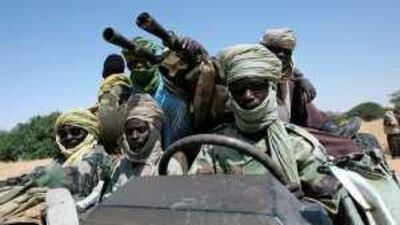NAIROBI // The conflict in Sudan's western Darfur region has grabbed headlines in recent years with politicians and movie stars condemning the fighting between Arab and African tribes and some labelling it genocide.
But a much more deadly and protracted war in Sudan is still simmering and threatens to destabilise the country as it looks towards key elections next year. An escalation in tensions in southern Sudan came to a head this month when 200 people were killed in fighting in the South Kordofan region. The United Nations special envoy to Sudan said the violent clashes were a cause for concern. "In recent months, the death rate in southern Sudan from violent conflict has been higher than in Darfur," Ashraf Qazi said.
"A secure environment is extremely important for the conduct of elections and the referendum." More than 1,000 people have been killed in fighting in southern Sudan in the last three months compared with 2,000 killed in Darfur in a year and a half, according to the UN. Nearly two million people died in Sudan's 22-year civil war between the Arab Muslim north and the Christian African south. A peace deal ended the war in 2005 and brought former southern rebels into a power-sharing agreement with the government in Khartoum.
As part of the deal, known as the Comprehensive Peace Agreement (CPA), the south is to hold a referendum on self determination in 2011, a year after a nationwide presidential election. The war in Darfur is a separate conflict that began in 2003 between Arab militias backed by government forces and African tribes living in the vast arid western region of Sudan. Besides being an ethnic conflict, Darfur is also a fight over scarce resources. The UN estimates that 300,000 people have died in the Darfur conflict, but the government puts the figure at 10,000. Recently, the UN downgraded the war in Darfur to a "low intensity conflict", in which about 150 people were dying every month.
Last week's fighting in the south began when 3,000 armed horsemen attacked police officers who were intervening in a conflict between two tribes, Sudan's state news agency reported. Violence has sporadically flared in the oil-rich region since 2005, especially around the town of Abyei. Last year clashes between government troops and former southern rebels rased Abyei and forced 25,000 to flee. The south appears to be rearming and preparing for another war with the north as the 2011 referendum approaches, according to a report last week by the Small Arms Survey, a Swiss think tank. "The government of Southern Sudan's security planning continues to be largely based on the perception that the north is actively working to undermine the CPA and that a future war is likely," the report said.
Tensions between the north and south threaten the already delayed presidential elections, according to analysts. "The insecurities in the south make it difficult to have comprehensive elections in 2010," said Fouad Hikmat, Horn of Africa director at International Crisis Group, a Brussels-based think tank. "The question is 'Are the elections going to happen?'" Mr Hikmat added that, "there is a huge gap" between the north and south and, "they are not working in partnership" as they should under the peace agreement.
Sudan's first democratic election in more than 20 years was supposed to be held this year, but was put off until Feb 2010 to allow for more time for a key census to take place. The census results, announced last month, showed that southerners make up 20 per cent of the country. The southern Sudanese government rejected the result saying that southerners account for at least a third of the population. Analysts say the census is important because it will prepare constituents for the upcoming election and will determine the make-up of future oil wealth and power sharing agreements.
Omar al Bashir, who has held power in Sudan since a 1989 coup, has said he will run in the elections for the northern-dominated National Congress Party despite an international warrant for his arrest for war crimes charges stemming from the Darfur conflict. The southern Sudan People's Liberation Movement will likely run Salva Kiir, a former rebel leader who became vice president of Sudan in a power-sharing deal that was part of the peace agreement. If he were to win the election, it is unclear if Mr Kiir, who is also president of semiautonomous southern Sudan, would be able to lead southern Sudan to independence in the 2011 referendum.
Analysts think that a coalition of opposition groups could form with better chances of unseating Mr al Bashir. Hassan al Turabi, an Islamist scholar and a former ally of Mr al Bashir, would be a dark horse in the election if he decides to run. The leader of an opposition group, Mr al Turabi has been in and out of jail recently as a political prisoner. mbrown@thenational.ae

